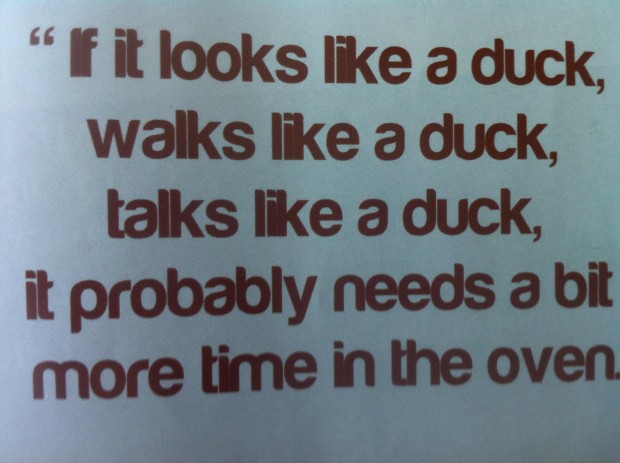If it looks like a duck, walks like a duck and quacks like a duck it might still not be...
Recent discussion on the educational curriculum’s inadequacy when it comes to science keeps politicians trying to throw more money at the problem.
Putting that issue into my problem-solving box, a major idea springs out.
We teach science one way or another at schools, this might not be that relevant and it certainly wasn’t in my day when I was in the engineering stream at Duntroon, but either way we are told it is an exact science and conclusions should be accepted for what they are. The problem is that acceptable science does not correlate to actual science. It does not really matter what something really IS until people believe it. The problem is that people can show for example that in 6th century BC Pythagoras suggested that the earth was spherical and this became accepted as fact in the 3rd century BC but some will refuse to agree since they have always been told it is flat. They also look at biblical verses to back this up [Isaiah 40:22]. And remember when the bible story was first conceived, people were not very literate and did not have the benefit to look up facts on Google.
Talking of Google leads us to the numerous search engines available and how we are subjected daily to real truth and the kind President Trump is always on about. You have too much strange input following posts on Futurism and plans to inhabit Mars and some people just switch out and go back to what they know. Not a good approach for pursuit of scientific conclusions which can help mankind.
So, if scientific fact is not accepted, but should be, this suggests that there should be a new subject attached to the science curriculum in which as a humanities subject, individuals can be trained to evaluate science for its worth. Instead of a common conception, “All coal bad”; “all uranium bad”, all sides of the argument need to be explored. Not to say that different ways of debating do not already exist. You can follow negotiating techniques as I have laid out in my negotiating seminars, or in my book, Negotiating for life, but there does not seem to exist a university course other than on general PR, designed to overcome group disbelief.
With so much focus now in saving the planet with a bludgeoning population explosion, it is more necessary than ever to start educating the population on mass and I quote my first major involvement with the issue during the Tasmanian Hydroelectric commission bid to flood Lake Pedder and the Franklin River. Their argument, “electricity for all, for as long as you can predict”. The Lake Peddar Action Committee’s argument “that this was such a pristine and beautiful wilderness it should be preserved for generations to come”. The lake was flooded. I was on the action committee but also one of my clients’ major customers was the Hydro. Fairly inbred there. Would I have liked to save the Lake; Yes? Was it inevitable at the time that it would be flooded anyway; Yes?
At that time, nothing would have saved the wilderness or the hundreds of years old forests. Because of the group think of the time. My argument is that if this same situation arose at a later time, perhaps there would be an argument to have SCIENCE show how the same amount of electricity could have been generated some other way and the area could have been saved. I don’t have the answer to, save the environment,but sometime the question “how? ´ is more difficult than the answer. Should we not go and see if we can? Things are not always as they seem even if ducks which quack might be.
Perhaps someone has to go up on a mountain for a couple of months and come back with a new manifesto saying no two people will ever agree on everything but at least they should be able to discuss their differences rather than adopt a destructive criticism of everything which helps no one. 